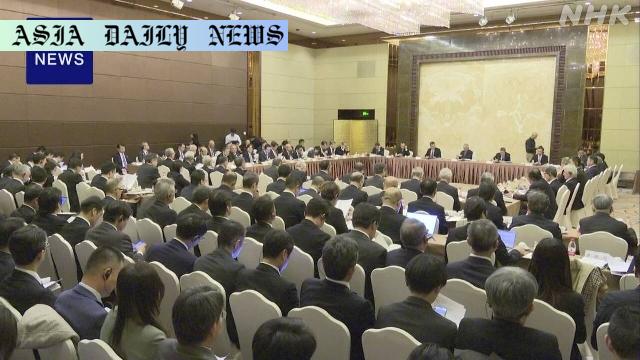Cooperation: Japanese business leaders and Chinese officials emphasize joint efforts to tackle shared challenges like decarbonization and aging society.
- Japanese and Chinese officials agree on stronger cooperation in decarbonization, aging society, and economic growth.
- Focus on sharing Japanese expertise in energy saving, medical care, and innovative solutions.
- Addressing economic security issues like protectionism and tariffs for long-term bilateral benefits.

Introduction to the Japan-China Cooperation
On Monday, Japanese business leaders and senior Chinese government officials convened in Beijing to discuss collaborative opportunities aimed at addressing mutual challenges. The meeting, facilitated by the Japan-China Economic Association and China’s National Development and Reform Commission, emphasized the strengthening of economic ties and joint solutions to shared issues such as decarbonization and demographic aging.
Shared Challenges: Decarbonization and Aging Society
Both Japan and China face pressing challenges in combating climate change and managing the aging demographic within their populations. Delegates from the Japanese side highlighted the necessity of collaborating on energy-saving initiatives, renewable energy integration, medical care, and innovative solutions for aging society management. These areas are critical for ensuring sustainable development and a high quality of life for aging populations in both countries.
Tackling Economic Security Risks
One of the central concerns raised during the discussions was the impact of excessive restrictions, protectionist tariffs, and economic countermeasures. Shindo Kosei, the head of the Japan-China Economic Association, emphasized that such risks create barriers to a cooperative economic landscape. He argued that addressing these issues proactively is essential for both nations not only to stabilize their economies but also to encourage smoother bilateral trade relations.
Spotlight on Japanese Firms’ Role
Chinese officials recognized the importance of Japanese firms in fostering bilateral cooperation and innovation. The delegation present included established global Japanese companies with vast experience in technology, healthcare, and energy efficiency. Chinese representatives expressed interest in leveraging Japan’s experience and knowhow in areas such as energy management and elder care, with an aim to integrate these strategies into their domestic initiatives.
Outlook for Future Cooperation
The meeting concluded with a mutual commitment to fostering deeper partnerships across various sectors. By addressing shared global and regional challenges together, both Japan and China aspire to lead by example in confronting environmental, economic, and social issues. Collaborative projects and open dialogue could pave the way for innovative solutions, pointing toward stronger economic growth and robust cultural ties.
Conclusion
This strategic partnership between Japan and China signifies a crucial step forward in bolstering regional economic stability and addressing global challenges collaboratively. As both countries chart a path forward, their cooperative efforts could serve as a model for other nations facing similar challenges. By leveraging their respective strengths and experiences, Japan and China have the potential to foster sustainable growth and lasting regional harmony.



Commentary
Reflections on Japan-China Cooperation
The recent meeting between Japanese business leaders and Chinese officials is a welcome development in a time of heightened global uncertainty. It highlights the importance of collaborative efforts in addressing significant cross-border issues such as decarbonization and aging populations. These challenges are not limited to national borders, making international cooperation imperative for effective solutions.
Importance of Economic Partnership
Economic partnerships like this are vital for ensuring stability and prosperity in a rapidly changing world. By emphasizing knowledge-sharing and building bridges in critical areas like technology, energy efficiency, and elder care, Japan and China are setting an example for other nations. This partnership shows that even amidst geopolitical tensions, there can be room for dialogue and mutual progress.
Potential Long-Term Impact
Looking ahead, the collaborative projects stemming from this partnership could provide scalable solutions to global issues such as climate change and demographic shifts. If successful, they might also open doors for expanded diplomatic ties and a more interconnected economic framework. With the right focus and commitment, this partnership has the potential to benefit not only Japan and China but the world as a whole.